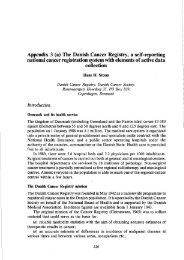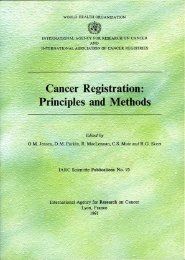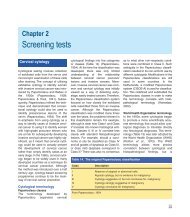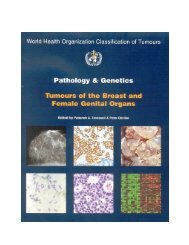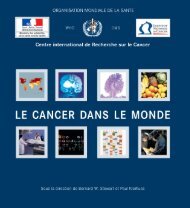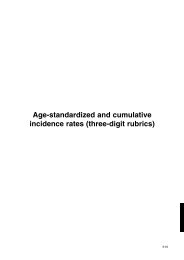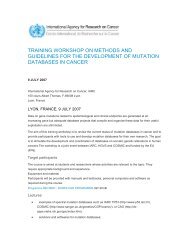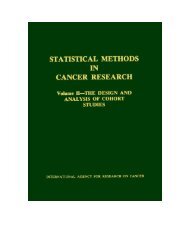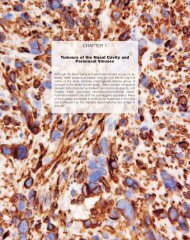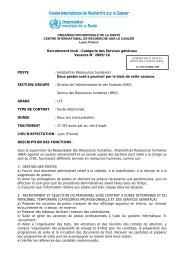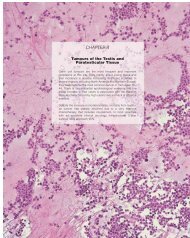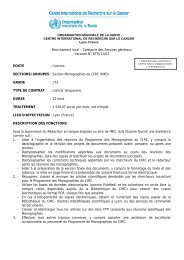world cancer report - iarc
world cancer report - iarc
world cancer report - iarc
You also want an ePaper? Increase the reach of your titles
YUMPU automatically turns print PDFs into web optimized ePapers that Google loves.
DIET AND NUTRITION<br />
SUMMARY<br />
> Up to 30% of human <strong>cancer</strong>s are probably<br />
related to diet and nutrition.<br />
> Excess salt intake causes arterial hypertension<br />
and an elevated risk of stomach<br />
<strong>cancer</strong>. Due to modern methods of food<br />
preservation, the incidence of stomach<br />
<strong>cancer</strong> is declining <strong>world</strong>wide.<br />
> A Western diet (highly caloric food rich in<br />
animal fat and protein), often combined<br />
with a sedentary lifestyle and hence energy<br />
imbalance, increases the risk of colon,<br />
breast, prostate, endometrial and other<br />
<strong>cancer</strong>s.<br />
> Physical activity, avoidance of obesity,<br />
and frequent daily intake of fresh fruit<br />
and vegetables reduce the risk of oral<br />
cavity, lung, cervix uteri and other <strong>cancer</strong>s.<br />
The incidence of most <strong>cancer</strong>s varies<br />
<strong>world</strong>wide and <strong>cancer</strong>s of the breast,<br />
colorectum, prostate, endometrium, ovary<br />
and lung are generally much more frequent<br />
in the developed countries. These<br />
<strong>cancer</strong>s are a major burden in countries of<br />
Europe, North America and in Australia.<br />
They are markedly less frequent in developing<br />
countries of Asia and Africa. In contrast,<br />
some <strong>cancer</strong>s of the digestive system,<br />
including those of the stomach and<br />
liver, are more frequent in developing<br />
countries of Central and South America,<br />
Africa and Asia than they are in the developed<br />
<strong>world</strong>.<br />
These observations, which were made<br />
more than 30 years ago with the publication<br />
of the first reliable data on <strong>cancer</strong><br />
incidence from population-based <strong>cancer</strong><br />
registries [1,2] are still substantially valid.<br />
They constitute one of the basic arguments<br />
for the hypothesis that environmental<br />
factors play an important role in<br />
<strong>cancer</strong> etiology. A principal environmental<br />
factor, now generally recognized as major<br />
62 The causes of <strong>cancer</strong><br />
determinant of <strong>cancer</strong> incidence, is diet.<br />
Over the past 20 years, many epidemiological<br />
studies, particularly case-control<br />
studies and, more recently, large cohort<br />
studies, have investigated the role of<br />
habitual diet in relation to the risk of<br />
developing different types of <strong>cancer</strong>.<br />
Vegetables and fruit<br />
The most consistent finding on diet as a<br />
determinant of <strong>cancer</strong> risk is the association<br />
between consumption of vegetables<br />
and fruit and reduced risk of several<br />
<strong>cancer</strong>s. Consumption of vegetables and<br />
fruit is associated with reduced risk of<br />
<strong>cancer</strong>s of the pharynx, larynx, lung,<br />
oesophagus, stomach and cervix uteri,<br />
while only vegetables, but not fruit, seem<br />
to protect against <strong>cancer</strong>s of the colon<br />
and rectum. During the last 30 years,<br />
over 250 epidemiological studies (casecontrol,<br />
cohort or ecological correlations)<br />
have been conducted around the<br />
<strong>world</strong> to investigate the relationship<br />
between fruit and vegetable consumption<br />
and <strong>cancer</strong> risk. About 80% of these<br />
studies found a significant protective<br />
effect of overall consumption of vegetables<br />
and/or fruit, or at least of some<br />
types of vegetables and fruits [3].<br />
Preliminary results from the large<br />
European Prospective Investigation into<br />
Cancer and Nutrition (EPIC) study confirm<br />
these results, suggesting, for example,<br />
that a daily consumption of 500 g of<br />
fruit and vegetables can decrease incidence<br />
of <strong>cancer</strong>s of the digestive tract by<br />
as much as 25% [4].<br />
Fruit and vegetables do not represent a<br />
major source of protein, fat, carbohydrates<br />
and therefore energy, but they can<br />
be major contributors of fibre, several<br />
vitamins, minerals and other biologically<br />
active compounds. Current hypotheses<br />
on mechanisms through which fruit and<br />
vegetables may protect against <strong>cancer</strong><br />
invoke the interaction of micro-constituents<br />
with the processes of carcinogen<br />
metabolism, protection of DNA<br />
integrity and intercellular communication.<br />
Such mechanisms have been studied<br />
extensively in experimental systems.<br />
Fig. 2.52 Dietary questionnaires used to assess the quantity of different food types consumed by the participant<br />
in a nutritional study.



